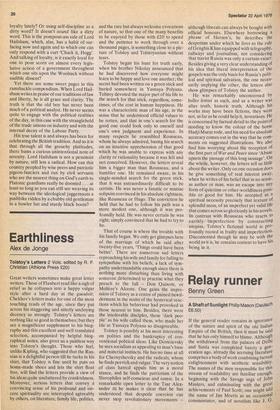Earthliness
Alex de Jonge
Tolstoy's Letters 2 Vols. edited by R. F. Christian (Athlone Press £20) Great writers sometimes make great letter writers. Those of Flaubert read like a sigh of relief as he collapses into a happy vulgar style after a hard day at the gueuloir, Chekhov's letters make for one of the most touching reads of the age, since they put across his staggering and utterly uncloying decency so strongly. Tolstoy's letters are nothing like so good in themselves; but they are a magnificent supplement to his biography and this excellent and well translated selection, accompanied by helpful biographical notes, also gives us a painless way into Tolstoy's thought. Those who feel, unlike Kipling, who suggested that the Russian is a delightful person till he tucks in his shirt, that Tolstoy is fine until he puts on home-made shoes and lets the shirt float free, will find the letters provide a view of his ideas quite uncluttered by crankishness. Moreover, serious letters that convey a convincing sense of his profound and sincere spirituality are interrupted agreeably by others, on literature, family life, politics,
and the rare but always welcome evocations of nature, so that one of the many benefits to be enjoyed by those with £20 to spend and the patience to work through over a thousand pages, is something close to a picture of Tolstoy and Tolstoyanism without tears.
Tolstoy began his hunt for truth early, when his brother Nikolay announced that he had discovered how everyone might learn to be happy and love one another; the secret had been written on a green stick and buried somewhere in Yasnaya Polyana.
Tolstoy devoted the major part of his life to the search for that stick, regardless, some times, of the cost in human happiness. He was a characteristic man of his age, in the sense that he understood official values to be rotten, and that in one's search for the good one could look only to oneself and one's own judgment and experience. In many respects he resembled Rousseau, whom he always admired, basing his search on an intuitive apprehension of that good which he was unable to express with any clarity or rationality because it was felt and not conceived. However, the letters reveal him 'a bigger man than Rousseau, and a humbler one. He remained aware, in his single-minded search for the green stick, that it was extraordinarily difficult to be certain. He was never a fanatic or maniac solipsist convinced in his absolute rightness, like Rousseau or Hugo. The conviction he held that he had to follow his path was a more modest one, although it was profoundly held. He was never certain he was right, simply convinced that he had to try to be.
That of course is where the trouble with his family began. We only get glimpses here of the marriage of which he said after twenty-five years, 'Things could have been better'. There are numerous sad letters reproaching his wife and family for failing to sympathise with his beliefs, a lack of sympathy understandable enough since there is nothing more disturbing than living with someone determined to practise what they preach to the full — Don Quixote, or Moliere's Alceste. One gains the impression of Tolstoy as a centre of pained bewilderment in the midst of the hysterical reactions which his behaviour had provoked in those nearest to him. Besides, there were the intolerable disciples, those 'dark people' as his wife called them, who made her life at Yasnaya Polyana so disagreeable.
Tolstoy is possibly at his most interesting on politics and the bankruptcy of conventional political ideas. Like Dostoievsky he sees socialism as appealing to man's base and material instincts. He has no time at all for Chernyshevsky and the radicals, whom he finds peeviih and vulgar. The very notion of class hatred appals him as a moral stance, and he finds the patriotism of the Slavophiles self-conscious and comic. In a remarkable open letter to the Tsar Alexander in he makes it clear that he has understood that despotic coercion can never stop revolutionary movements — although liberals can always be bought with official honours. Elsewhere borrowing a phrase of Herzen's, he describes the despotism under which he lives as the rule of Genghis Khan equipped with telegraphy, railways and journalism, not considering that tsarist Russia was only a curtain-raiser. Besides giving a very clear understanding of his idea that literal interpretation of the gospels was the only basis for Russia's political and spiritual salvation, the one necessarily implying the other, the letters also show glimpses of Tolstoy the author.
He was remarkably unconcerned by belles lettres as such, and as a writer was
after truth, historic truth. Although his works may have been fictions, they were not, as far as he could help it, inventions. He is concerned by factual detail to the point of needing to know the colour of the horse Hadji Murat rode, and his need for absolute
accuracy comes out in the way that he com
ments on suggested illustrations. We also find him worrying about the reception of
the first part of War and Peace since 'Abuse
upsets the passage of this long sausage'. On the whole, however, the letters tell us little about the writer. Only on one occasion does
he give something of real interest away, when he writes of his belief that in no sense, as author or man, was an escape into any form of quietism or other-worldliness possible or good for him. He accepted as a spiritual necessity precisely that texture of splendid mess, of an imperfect yet valid life that comes across so gloriously in his novels.
In contrast with Rousseau who reacts to earthly imperfection by constructing utopias, Tolstoy's fictional world is pro foundly rooted in frailty and imperfection. Discontented though he may be with the world as it is, he remains content to have his being in it.


































 Previous page
Previous page